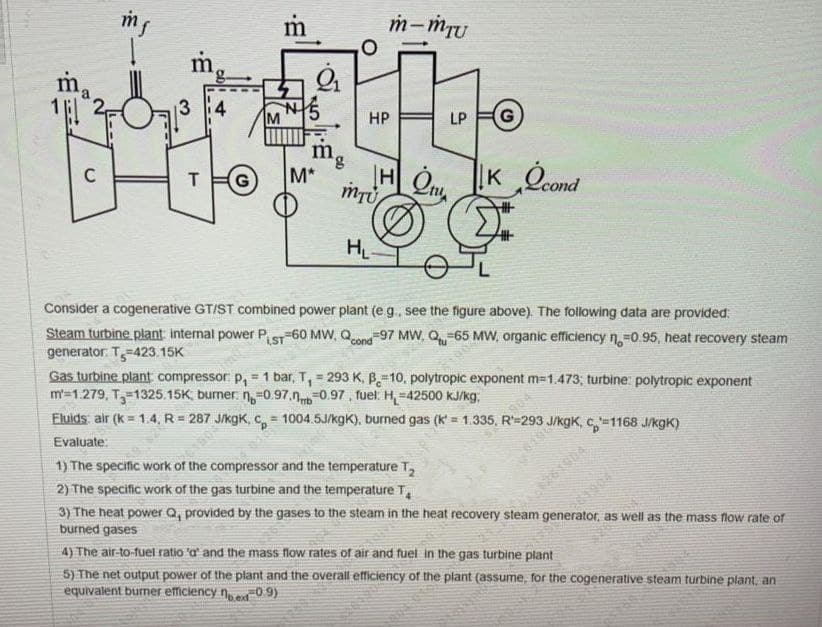Eluids air (k = 1.4, R = 287 J/kgK, C, = 1004.5J/kgK), burned gas (K' = 1.335. * K,1168 J/kgK) ms m-mTu m. 3 LP FG HP m. 8, M* MTU IK Ocond C T HL Consider a cogenerative GT/ST combined power plant (eg., see the figure above). The following data are provided. Steam turbine plant internal power P generator. T,-423.15K Gas turbine plant compressor m-1.279, T,-1325.15K, burner n,=0.97.nm0.97 , fuel. H,-42500 kJ/kg, (ST 60 MW, Qond=97 MW, Q65 MW, organic efficiency n.=0.95, heat recovery steam = 1 bar, T, = 293 K. B-10, polytropic exponent m=1.473; turbine: polytropic exponent %3! Evaluate: 1) The specific work of the compressor and the temperature T, 2) The specific work of the gas turbine and the temperature T, 1904 3) The heat power Q, provided by the gases to the steam in the heat recovery steam generator, as well as the mass flow rate of burned gases 4) The air-to-fuel ratio 'a' and the mass flow rates of air and fuel in the gas turbine plant 5) The net output power of the plant and the overall efficiency of the plant (assume, for the cogenerative steam turbine plant, an equivalent burner efficiency ne0.9)
Eluids air (k = 1.4, R = 287 J/kgK, C, = 1004.5J/kgK), burned gas (K' = 1.335. * K,1168 J/kgK) ms m-mTu m. 3 LP FG HP m. 8, M* MTU IK Ocond C T HL Consider a cogenerative GT/ST combined power plant (eg., see the figure above). The following data are provided. Steam turbine plant internal power P generator. T,-423.15K Gas turbine plant compressor m-1.279, T,-1325.15K, burner n,=0.97.nm0.97 , fuel. H,-42500 kJ/kg, (ST 60 MW, Qond=97 MW, Q65 MW, organic efficiency n.=0.95, heat recovery steam = 1 bar, T, = 293 K. B-10, polytropic exponent m=1.473; turbine: polytropic exponent %3! Evaluate: 1) The specific work of the compressor and the temperature T, 2) The specific work of the gas turbine and the temperature T, 1904 3) The heat power Q, provided by the gases to the steam in the heat recovery steam generator, as well as the mass flow rate of burned gases 4) The air-to-fuel ratio 'a' and the mass flow rates of air and fuel in the gas turbine plant 5) The net output power of the plant and the overall efficiency of the plant (assume, for the cogenerative steam turbine plant, an equivalent burner efficiency ne0.9)
Principles of Heat Transfer (Activate Learning with these NEW titles from Engineering!)
8th Edition
ISBN:9781305387102
Author:Kreith, Frank; Manglik, Raj M.
Publisher:Kreith, Frank; Manglik, Raj M.
Chapter10: Heat Exchangers
Section: Chapter Questions
Problem 10.17P
Related questions
Question
100%
Please answer the first 3 parts. ASAP

Transcribed Image Text:m
m-mTU
ma
3
4.
LP FO
M
HP
m.
3,
M*
C
K
K Ocond
HL
Consider a cogenerative GT/ST combined power plant (e g., see the figure above). The following data are provided:
Steam turbine plant internal power PST-60 MW, Qond97 MW, Q-65 MW, organic efficiency n.=0.95, heat recovery steam
generator. T,-423.15K
Gas turbine plant compressor p, = 1 bar, T, = 293 K, B,-10, polytropic exponent m=1.473; turbine: polytropic exponent
m=1.279, T,=1325.15K, burner. n=0.97,n=0.97, fuel. H-42500 kJ/kg,
Fluids air (k = 1.4, R= 287 J/kgK, c = 1004.5J/kgK), burned gas (k' = 1.335, R'=293 J/kgK, c=1168 J/kgK)
iST
190
80
1) The specific work of the compressor and the temperature T,
Evaluate:
2) The specific work of the gas turbine and the temperature T,
3) The heat power Q, provided by the gases to the steam in the heat recovery steam generator, as well as the mass flow rate of
burned gases
4) The air-to-fuel ratio 'a' and the mass flow rates of air and fuel in the gas turbine plant
5) The net output power of the plant and the overall efficiency of the plant (assume, for the cogenerative steam turbine plant, an
equivalent burner efficiency ne0.9)
Expert Solution
This question has been solved!
Explore an expertly crafted, step-by-step solution for a thorough understanding of key concepts.
Step by step
Solved in 3 steps

Knowledge Booster
Learn more about
Need a deep-dive on the concept behind this application? Look no further. Learn more about this topic, mechanical-engineering and related others by exploring similar questions and additional content below.Recommended textbooks for you

Principles of Heat Transfer (Activate Learning wi…
Mechanical Engineering
ISBN:
9781305387102
Author:
Kreith, Frank; Manglik, Raj M.
Publisher:
Cengage Learning

Principles of Heat Transfer (Activate Learning wi…
Mechanical Engineering
ISBN:
9781305387102
Author:
Kreith, Frank; Manglik, Raj M.
Publisher:
Cengage Learning